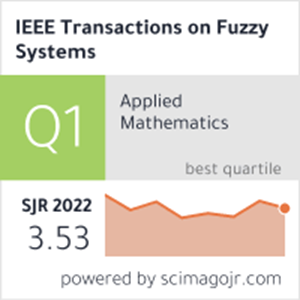A Fuzzy Measure and Choquet Integral-Based Approach in the Predictive Knowledge-Based Systems: Application to the Electricity Demand Forecasting
IF 10.7
1区 计算机科学
Q1 COMPUTER SCIENCE, ARTIFICIAL INTELLIGENCE
引用次数: 0
Abstract
In a data-driven knowledge-based forecasting system, knowledge can be extracted from historical data by machine learning methods, and represented in the knowledge base. In the inference engine of such a system, the current inputs are used to forecast the likely outputs. The unpredictability of one (or more) inputs in the forecasting horizon, gives rise to one source of uncertainty in the reasoning process, named evidence uncertainty, which is the main focus of this article. To deal with this sort of uncertainty numerical scenarios are generated from historical data to substitute the uncertain input parameter using two approaches: Uniform sampling, and a classical nonuniform sampling acceptance–rejection method. Each input scenario has particular output, and at the end these outputs are aggregated with the discrete Choquet integral to account for outputs' dependencies. Fuzzy measures, also called capacities or nonadditive measures, assign the importance weight not to just each scenario but also to groups of scenarios. A fuzzy measure for the Choquet integral is learned from the historical data. The proposed reasoning approach is evaluated in a long-term relative electricity load forecasting, and treats the uncertainty which arises from unpredictability of the daily temperature in the long run. The results show the superiority of the proposed Choquet integral-based approach with respect to the基于模糊测度和Choquet积分的预测知识系统方法在电力需求预测中的应用
在数据驱动的基于知识的预测系统中,可以通过机器学习方法从历史数据中提取知识,并在知识库中表示。在这种系统的推理引擎中,使用当前输入来预测可能的输出。预测视界中一个(或多个)输入的不可预测性,在推理过程中产生了一个不确定性来源,称为证据不确定性,这是本文的主要焦点。针对这类不确定性,采用均匀抽样和经典的非均匀抽样接受-拒绝法两种方法,从历史数据中生成数值情景来代替不确定的输入参数。每个输入场景都有特定的输出,最后,这些输出与离散Choquet积分一起汇总,以说明输出的依赖性。模糊度量,也称为能力或非加性度量,不仅将重要性权重分配给每个场景,而且还分配给场景组。从历史数据中学习了Choquet积分的模糊测度。提出的推理方法在长期相对电力负荷预测中进行了评估,并处理了由于长期日温度不可预测性而产生的不确定性。结果表明,与传统的加权算术平均值和有序加权平均方法相比,基于Choquet积分的方法在k -交互、k -加性和k -容限模糊测度方面具有优越性。
本文章由计算机程序翻译,如有差异,请以英文原文为准。
求助全文
约1分钟内获得全文
求助全文
来源期刊

IEEE Transactions on Fuzzy Systems
工程技术-工程:电子与电气
CiteScore
20.50
自引率
13.40%
发文量
517
审稿时长
3.0 months
期刊介绍:
The IEEE Transactions on Fuzzy Systems is a scholarly journal that focuses on the theory, design, and application of fuzzy systems. It aims to publish high-quality technical papers that contribute significant technical knowledge and exploratory developments in the field of fuzzy systems. The journal particularly emphasizes engineering systems and scientific applications. In addition to research articles, the Transactions also includes a letters section featuring current information, comments, and rebuttals related to published papers.
 求助内容:
求助内容: 应助结果提醒方式:
应助结果提醒方式:


